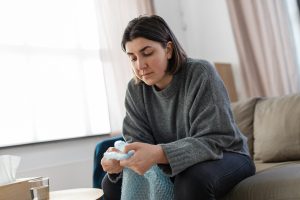A yeast infection can be bothersome and uncomfortable for everyone. Whether it’s your first encounter or an unfortunate recurrence, finding the best yeast infection medicine becomes paramount in alleviating symptoms and restoring peace to your body.
With many options available on the market, it can be overwhelming to navigate through them all to find the best option for you.
Best Yeast Infection Medicines
Candidiasis can be distressing and uncomfortable, but finding the best yeast infection medicine is crucial for relieving symptoms.
One of the most common treatments for candidiasis is over-the-counter antifungal medications. These creams or suppositories contain active ingredients like clotrimazole or miconazole, which kill or stop yeast cell growth. They are easily accessible and can provide relief within a few days.
For more severe or recurrent candidiasis, prescription medications such as fluconazole may be necessary.
This oral pill works systemically to eliminate the underlying fungal infection throughout your body. It requires a doctor’s prescription but offers swift relief in just one dose.
It’s essential to consult a healthcare expert before starting any treatment plan to ensure an accurate diagnosis and proper guidance regarding recommended dosage and duration based on individual circumstances.
What to Look for in the Best Yeast Infection Medicines
There are vital pointers when deciding the best yeast overgrowth infection medicine. First and foremost, it is critical to look for a treatment that attacks the root cause of the infection.
Look for medications or products containing antifungal agents designed to combat yeast overgrowth.
Another crucial consideration is the ease of use. Some treatments may require multiple daily applications, while others can be taken in pill form.
Additionally, consider the potential side effects of any treatment you are considering. While most candidiasis medications are generally safe, some may experience adverse reactions such as itching or burning.
It’s always wise to read reviews or consult a healthcare professional to ensure you choose a treatment with minimal side effects.
Best over-the-counter yeast overgrowth infection treatments
Whether it’s your first time experiencing one or a recurrent issue, finding the best over-the-counter treatment is crucial for alleviating candidiasis symptoms and restoring comfort to your body.
Several factors must be considered when choosing the best over-the-counter medicine for candidiasis. One popular option is antifungal creams containing active ingredients like clotrimazole or miconazole.
These creams are widely available without a prescription and can provide relief by targeting the source of the infection.
Additionally, vaginal suppositories or boric acid tablets with antifungal properties can effectively treat candidiasis.
Another alternative to consider is probiotics formulated explicitly for vaginal health. These supplements contain beneficial bacteria strains that help restore balance in your body’s natural flora and prevent future infections from occurring. In addition, tea tree oil is known to have antibacterial properties.
Read also: How Long Does a Yeast Infection Last
Best prescription yeast infection medicines
Prescription medications often provide the most effective relief from yeast overgrowth infection. One of the best options is fluconazole, an oral antifungal medication that targets the root cause of the infection and helps eliminate symptoms such as itching and discharge.
Fluconazole is easy to take, usually requiring a single dose, making it convenient for those who want quick relief.
Another prescription treatment worth considering is clotrimazole cream or suppositories. These antifungal medications are applied directly to the affected body area and work by killing the fungus causing the infection.
Clotrimazole can be used for skin and vaginal yeast infections, providing fast-acting relief from symptoms like redness and irritation.
If you have persistent or severe candidiasis, consulting with your healthcare provider about these best prescription treatments can help ensure you receive a proper diagnosis and appropriate treatment for long-lasting symptom relief.
Remember always to follow your doctor’s instructions carefully when using any medication.
The upsides of creams for vaginal yeast infections
Topical medications have several upsides, making them a popular choice for many women. Firstly, creams offer localized relief to the affected area, allowing targeted treatment and faster symptom alleviation. This can provide immediate comfort and help restore peace to the body.
Additionally, creams are easy to apply and come with applicators that ensure proper application deep into the vagina for maximum efficacy.
Another advantage of using creams is their potential soothing effect on irritated skin. Many antifungal creams contain natural oils or moisturizers that can help alleviate itching, redness, and discomfort associated with the infection.
Applying these creams not only fights against the infection itself but also relieves bothersome symptoms.
The upsides of the yeast infection pill
The yeast overgrowth infection pill has several upsides, making it a popular choice. Firstly, the convenience and ease of use is a significant advantage.
Unlike creams or suppositories that require frequent applications, the pill can be taken orally in just one dose. This makes it not only more convenient but also less messy and time-consuming.
The pill is highly effective in treating acute and chronic infections. It works by attacking the root cause of the infection internally, eliminating the need for external treatments that may provide only temporary relief.
By tackling the problem at its source, this medication offers long-lasting results and minimizes the chances of recurrence.
Monistat 1-Day Yeast Infection Treatments
Monistat 1-day therapy is a trusted and popular option for women seeking relief from the discomfort of candidiasis.
This one-day treatment offers a fast and convenient solution to combatting the symptoms of a yeast overgrowth infection, such as itching, burning, and vaginal discharge.
What sets Monistat 1-Day treatment apart is its effectiveness in treating external and internal symptoms. With just one application, this powerful antifungal medication starts working immediately to eliminate the source of your discomfort.
It delivers targeted relief directly where needed most, allowing you to resume your daily duties without interruption or ongoing inconvenience quickly.
Can You Treat Yeast Infections With Diflucan?
Diflucan, an antifungal medication often prescribed to treat bacterial vaginosis and vaginal candidiasis, is a reliable and effective option.
As one of the most commonly prescribed oral medicines for candidiasis, Diflucan inhibits the reproduction of the Candida fungus responsible for causing the infection.
Its systemic approach makes it particularly useful in addressing stubborn or recurrent cases.
Many individuals find that Diflucan relieves uncomfortable symptoms such as itching and discharge. With a single-dose formulation available, it offers convenience and ease of use.
However, Diflucan has possible side effects, such as nausea and headache, which should be discussed with a healthcare provider before beginning treatment.
Diflucan is a good choice when searching for an effective medication for candidiasis. Consultation with a medical expert is essential to determine whether it suits your situation and explore alternative treatment options if necessary.
When to see a doctor
Knowing when to see a doctor is vital for effective treatment. If you have never experienced a yeast overgrowth infection before and are unsure of the symptoms, it is recommended to seek medical advice.
Common signs include itching, burning, redness, and discharge in the genital area. Additionally, if your symptoms persist or worsen after using over-the-counter treatments or natural remedies, it may be time to consult a medical expert.
They can carry out tests to diagnose and prescribe more potent medication for more effectiveness.
It’s also crucial to seek medical help if you experience recurrent candidiasis (more than four per year) or have underlying health conditions like diabetes, making treating the condition more challenging.
A healthcare professional can comprehensively assess your situation and provide personalized guidance based on your circumstances.
Remember, seeing a doctor for your yeast overgrowth infection ensures proper diagnosis and treatment so that you can find relief sooner rather than later.
Frequently Asked Questions
Several factors should be considered when choosing the best OTC medicine for yeast infection treatment. These include the severity of symptoms experienced, personal preferences such as ease of use or specific product features like applicators or creams, and any potential allergies or sensitivities one may have.
It is advisable to consult with a healthcare expert before proceeding with any self-treatment regime to receive appropriate guidance tailored to individual needs.
While multiple OTC treatments exist for vaginal yeast infections – including antifungal creams and suppositories containing active ingredients like miconazole nitrate or clotrimazole – selecting what suits you may involve some trial and error.
Again, consulting with a pharmacist or doctor can help find the most suitable option based on individual circumstances.
Yeast infections can be incredibly uncomfortable and distressing, but several medications can offer relief.
A medical expert may prescribe an oral antifungal medication like fluconazole for severe or recurrent infections. This single-dose medication is highly effective in treating yeast infections and offers convenience for those who prefer to avoid topical treatments.
However, it’s essential to remember that these oral medications should only be taken under medical supervision due to potential side effects.
It’s essential to consult your healthcare expert before starting any medication for a yeast infection.
They can recommend the most suitable treatment based on factors such as the severity of your symptoms and any prior allergic reactions you may have had.
The best doctor-recommended treatment often involves using antifungal medications. Over-the-counter options such as topical creams, suppositories, or oral tablets containing active ingredients like miconazole or clotrimazole can help relieve symptoms and effectively eliminate the infection.
These medications target and kill the yeast responsible for the infection, providing quick relief from itching, burning, and discharge.
Monistat 1 is a popular yeast infection treatment that offers fast relief. This one-dose product targets the source of discomfort and offers immediate relief from itching, burning, and irritation.
Monistat 1 contains a high dose of antifungal medication that effectively eliminates the yeast infection within one day.
The fast-acting nature of Monistat 1 makes it an ideal choice for people seeking quick relief from the symptoms associated with candidiasis.
It provides rapid results, allowing individuals to resume their normal activities without discomfort or inconvenience.
With its compassionate approach to women’s intimate health, Monistat 1 empowers individuals to regain control of their well-being and find peace in their bodies.
If you’re suffering from candidiasis, you may wonder if you can find relief by purchasing over-the-counter medication. The good news is that several options are available without needing a prescription.
These medications typically contain antifungal agents, such as miconazole or clotrimazole, which work to eliminate the yeast causing the infection.
It’s important to note that while over-the-counter medications can effectively treat mild to moderate yeast infections, they may not be sufficient for more severe cases.
If your symptoms remain or worsen after using these treatments, it’s crucial to consult with a healthcare professional for further evaluation and possible prescription-strength medication.
Additionally, practicing good hygiene and avoiding irritants like scented products or tight-fitting clothing is essential to prevent yeast infections.
Over-the-counter yeast infection medications can be an accessible and effective solution for many individuals experiencing discomfort caused by these fungal infections.
However, always prioritize your health and seek medical advice when needed for proper diagnosis and individualized treatment plans.
When choosing between Monistat 1 and Monistat 3 to treat vaginal yeast infection, the decision may depend on individual preferences and severity of symptoms.
Monistat 1 is a single-dose treatment that offers convenience and fast relief, but it can be more potent and may cause more substantial side effects than the prolonged regimen of Monistat 3.
On the other hand, Monistat 3 requires three days of application but typically provides milder symptom relief with potentially fewer adverse reactions.
A few options stand out when finding the most effective yeast infection medicine. Factors such as your medical history, previous experiences with yeast infections, and any allergies will all play a vital role in determining the most suitable therapy.
It’s also worth noting that lifestyle changes can help prevent future infections, including wearing breathable underwear and avoiding excessive moisture in intimate areas.
Overall, finding the right yeast infection medicine involves considering individual needs and seeking guidance from qualified healthcare providers.





